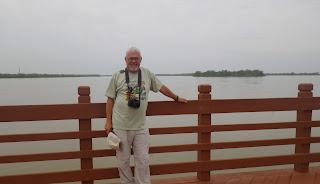At New Madrid, Missouri, The Mississippi River rolls by,
while across the wide meander one views Kentucky. Islands are above and below
and one such island is famous in its own way. It was called Island Number Ten,
during the civil war, and was the site of a Confederate Fort, but that’s not
why we are here.
I taught high school and college geology, for thirty years,
and whenever we get near something I taught about we always stop and visit. New
Madrid is the site of one of the most powerful earthquakes to hit the United
States. In 1811 a magnitude 7.5 earthquake shook the ground with such force
that the ground liquefied and erupted in sand geysers.
The Mississippi river was reported to flow backwards and at
least two waterfalls formed during the subsidence. Church bells were reported to
have rung in Charleston, South Carolina. Luckily the area was sparsely
populated and the only reported fatalities were from barges and boats on the
river.
Its looks so peaceful now, the streets are bordered by
flowering crab apple trees and many of the houses and stores are built of brick,
(which happen to be about the worst type house to own in an active earthquake
zone).
Our first stop was the New Madrid Museum, where they have
displays on the Mississippian Indians, the Mound builders, with many artifacts
dug from some of the nearby sites. Many skeletons were unearthed and hopefully
they have been reburied and are not sitting in storage.
Another display is an
actual sword that displays Spanish markings, perhaps from DeSoto’s expedition in
the sixteenth century!
The next room is filled with displays about the earthquake,
and you can listen to recordings made from written statements of the people
that live there during the disaster. One display lets you build a structure and
then dial up different magnitude earthquakes. Of course, your building is
destroyed.
The next room contains artifacts dug from the battle sites
and from a Union camp. One of the locals was a famous Confederate and many here
joined the Confederate army. A replica of an 1841 mountain howitzer stands
silently next to the filled display cases.
The second floor is filled with dresses, sewing machines,
and something we have never seen before, a family’s hair wreath from 1861. The
flowers are all made from actual hair of family members. That to me at least,
was macabre as I prefer memories and images instead of fragments of dead
people.
Now I can check another off another lesson plan from my
checklist of places I have taught about. The fault zone is still very active,
and another major earthquake could happen at any time. The day before a 2.5
magnitude earthquake had shook but that’s too mild for anyone to have felt it.
Our next stop is Springfield, Illinois, where we will visit
family and tour the Lincoln Memorial, Lincoln’s Tomb, and the Lincoln Library
and House. From there we will turn west and head for Iowa making stops in
Keosauqua, Waterloo, and Cresco/Decorah.
Clear skies










Interesting. Another place we have to visit. Travel safe!!!
ReplyDelete